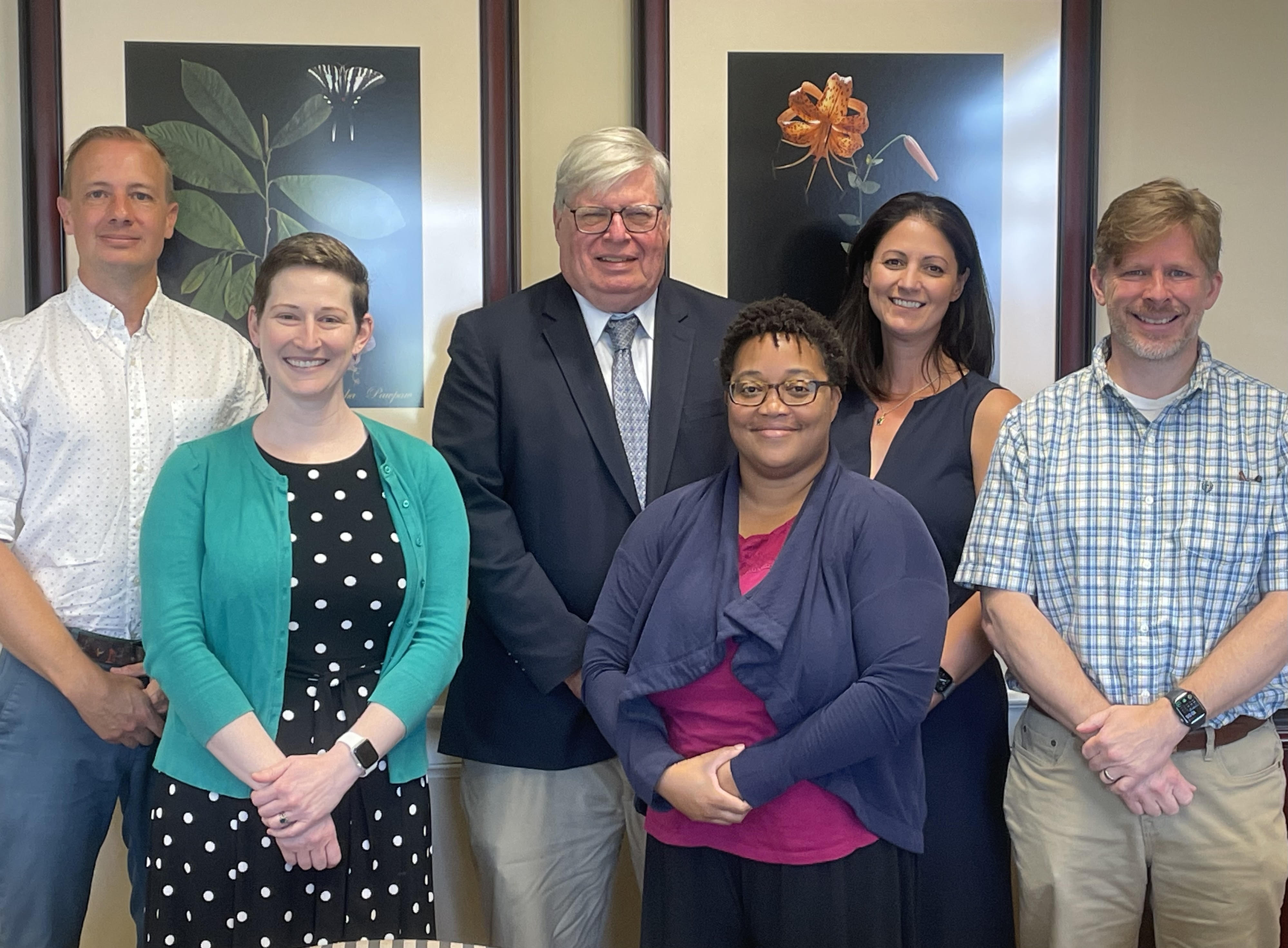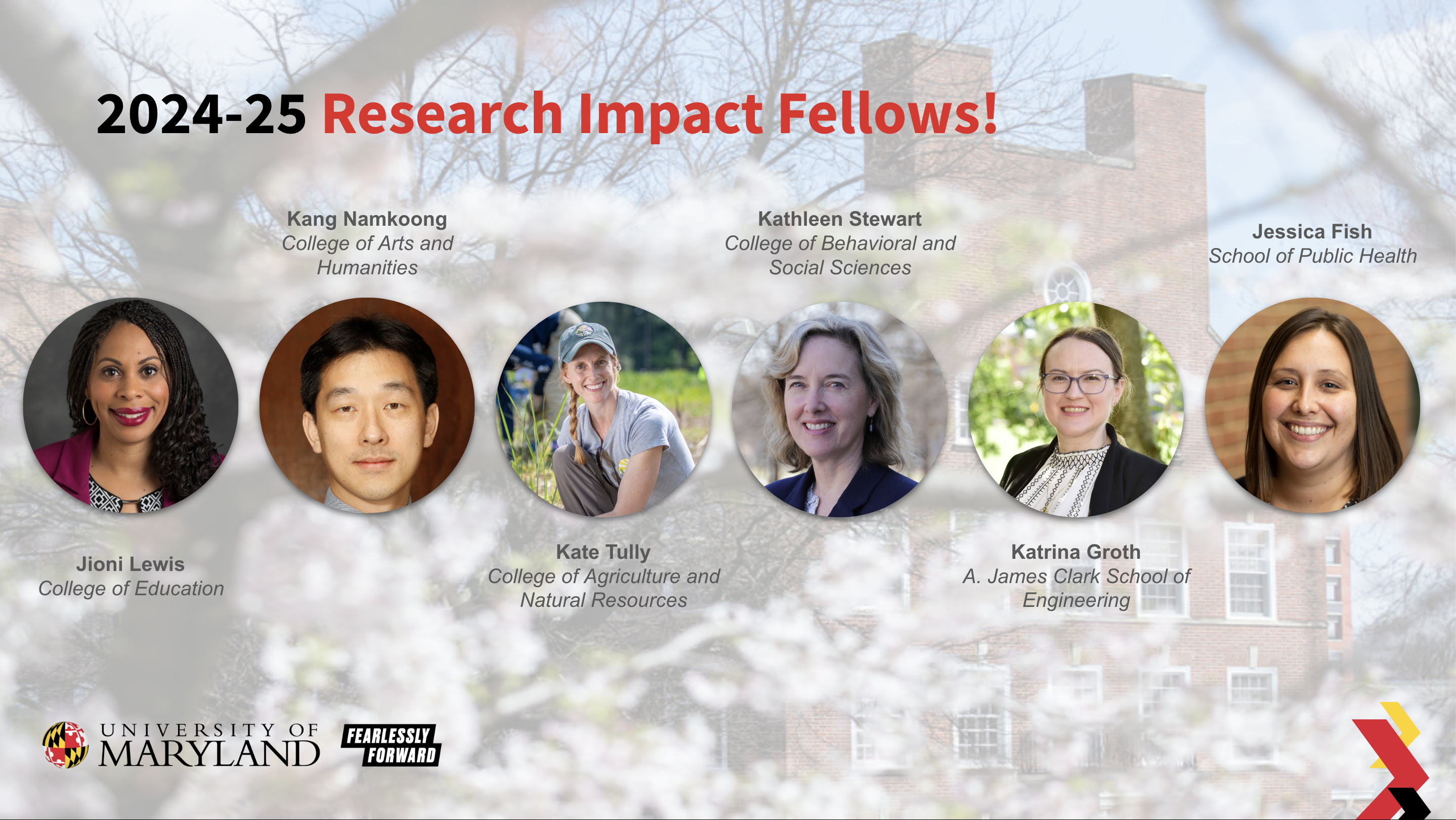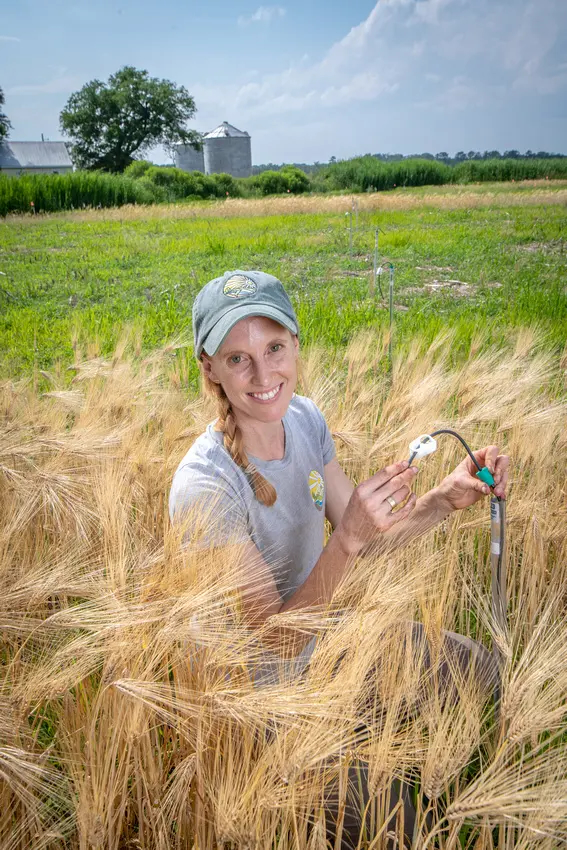Research Impact Fellows Program
The University of Maryland Research Impact Fellows Program is a 9-month collaborative program designed to equip research leaders at the University of Maryland with the skills and resources needed to communicate about their research findings and expertise to general audiences and key stakeholders.

Members of the program participate in interactive, results-focused sessions covering areas such as:
- developing key messages
- interacting with news media
- government relations
- social media best practices
- visual communications
Increasing the researchers' confidence in engaging with the media and communicating with general audiences is a core goal of the program. Members of the inaugural cohort were quoted in external media outlets, participated in panels on Capitol Hill, and testified before the state legislature.
At the conclusion of the program, participating faculty are designated as University of Maryland Research Impact Fellows and leave with tailored materials that may include media pitch plans, Op-Ed drafts, and social media strategies.
2024-25 Research Impact Fellows

The 2024-25 Research Impact Fellows include faculty from the College of Education, College of Arts and Humanities, College of Agriculture and Natural Resources, College of Behavioral and Social Sciences, A. James Clark School of Engineering, and School of Public Health. Together, they have expertise in mental health, racism and sexism, health communications, food production sustainability, climate change, and energy systems. They have been quoted in The New York Times, The Atlantic, and Today and have over 27,000 citations.
Meet the new cohort of Research Impact Fellows:
Dr. Kate Tully, College of Agriculture & Natural Resources

Kate Tully is an associate professor of Agroecology in the Department of Plant Science and Landscape Architecture and the director of the Agroecology Lab with expertise in plant science and the sustainability of food production systems. Her research in the Mid-Atlantic explores balancing farm productivity with ecosystem services and how cover crops can improve nutrient cycling, carbon sequestration, and water quality. On the Lower Eastern Shore of the Chesapeake Bay, she studies the effects of saltwater intrusion on nutrient release from farmland and its impact on agriculture and the environment.
Find Dr. Kate Tully on Socials: Twitter/X | LinkedIn | Instagram
Dr. Katrina Groth, A. James Clark School of Engineering

Katrina Groth is an associate professor of Mechanical Engineering, director of the Reliability Engineering Program, director of Systems Risk and Reliability Analysis Lab (SyRRA), and associate director for research in the Center for Risk and Reliability. She specializes in safety, risk, and reliability analysis of energy systems. Her research, including the development of the HyRAM toolkit for hydrogen risk assessment, has significantly influenced safety practices and standards across various energy sectors.
Find Dr. Katrina Groth on Socials: LinkedIn
Dr. Jessica Fish, School of Public Health

Jessica Fish is an associate professor of Family Science and co-director of the UMD Prevention Research Center. Her work focuses on health equity of LGBTQ+ youth by studying the social and interpersonal factors that affect the development and health of sexual and gender minority youth and adults. Her work aims to identify changeable factors that contribute to health disparities, guiding policies and programs that promote the well-being of sexual and gender minorities throughout their lives.
Find Dr. Jessica Fish on Socials: Twitter/X | LinkedIn
Dr. Jioni A. Lewis, College of Education

Jioni A. Lewis is an associate professor of Counseling Psychology and co-director of Training in Counseling Psychology. She researches the impact of discrimination on the mental and physical health of Black, Indigenous, and People of Color (BIPOC). Lewis’ work focuses on the intersection of racism and sexism experienced by women of color and BIPOC college students. She also examines resistance, healing, and protective factors that buffer individuals against the negative effects of gendered racism, such as collective coping strategies, gendered racial identity, and radical healing.
Find Dr. Jioni Lewis on Socials: Twitter/X | LinkedIn
Dr. Kathleen Stewart, College of Behavioral and Social Sciences
 Kathleen Stewart is a professor of Geographical Sciences and the director of the Center for Geospatial Information Science. She specializes in geographic information science with a focus on geospatial dynamics. Her research explores mobility, spatial access, and movement patterns across various domains, such as health and transportation, using big geospatial data and spatial data science approaches. Stewart also investigates geospatial semantics, spatiotemporal information retrieval, climate change, global health, and social inequality.
Kathleen Stewart is a professor of Geographical Sciences and the director of the Center for Geospatial Information Science. She specializes in geographic information science with a focus on geospatial dynamics. Her research explores mobility, spatial access, and movement patterns across various domains, such as health and transportation, using big geospatial data and spatial data science approaches. Stewart also investigates geospatial semantics, spatiotemporal information retrieval, climate change, global health, and social inequality.
Find Dr. Kathleen Stewart on Socials: LinkedIn
Dr. Kang Namkoong, College of Arts and Humanities

Dr. Kang Namkoong is an associate professor of Communications. Namkoong's research focuses on the interplay between emerging media and health communication, particularly through web- and mobile-based eHealth systems, cancer communication, and health promotion. His work includes treatment-oriented health interventions that explore the benefits of interactive communication technologies for patients, as well as prevention-oriented campaigns aimed at reducing health disparities among underserved populations.
